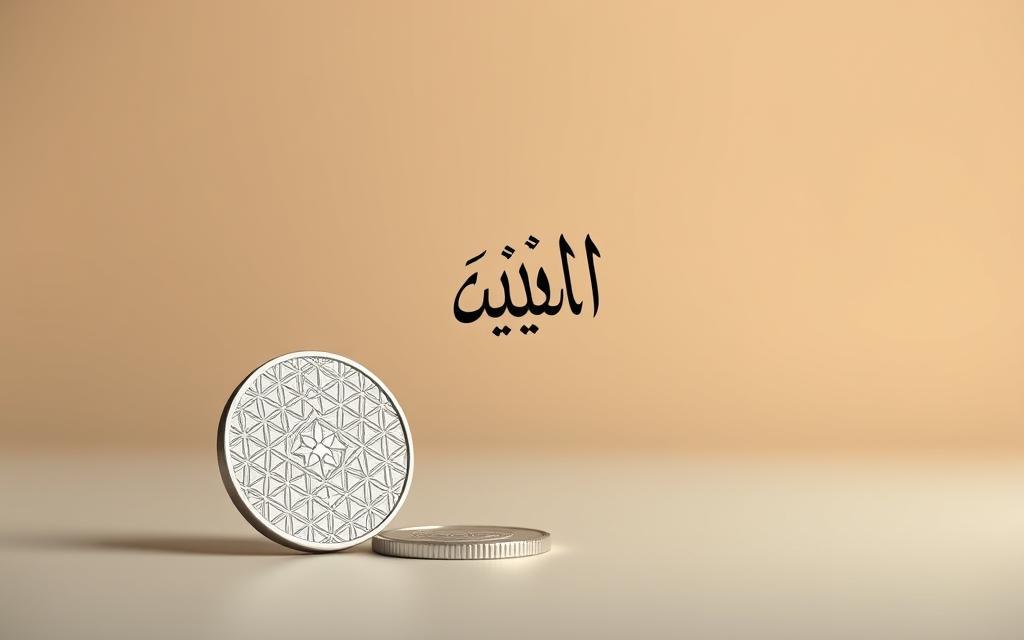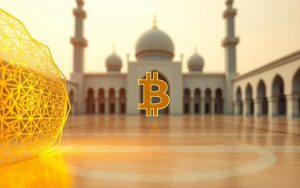Table of Contents
The debate around digital assets and their compliance with Sharia law continues to grow. Muslim investors worldwide question whether these modern financial tools align with traditional principles.
Bitcoin, often called “digital gold,” sparks discussions. Some view it as a speculative tool, while others consider it a long-term store of value. With a market cap surpassing $1.5 trillion, its role in Islamic finance remains debated.
Projects like Islamic Coin (ISLM) aim to bridge this gap. Designed for Muslim investors, it emphasizes Sharia compliance and is available on platforms like Changelly. The rise of such tokens highlights the demand for ethical alternatives.
Key concerns include classification as Māl (wealth), avoiding riba, and ensuring ethical use cases. As adoption grows—with exchanges like MEXC hosting 2,700+ pairs—scholarly guidance becomes essential for individual decisions.
Understanding Cryptocurrency and Its Key Features
Digital currencies have transformed global finance, raising questions about their compatibility with ethical frameworks. Unlike traditional currency, these cryptocurrencies operate without a central authority, relying instead on cryptographic security and decentralized networks.
What Is Cryptocurrency?
A cryptocurrency is a digital or virtual asset designed as a medium of exchange. It uses cryptography to secure transactions and control new unit creation. Bitcoin, the first such currency, introduced a capped supply of 21 million coins, contrasting with Ethereum’s flexible smart-contract ecosystem.
How Blockchain Technology Works
At the core of most cryptocurrencies is blockchain—a distributed ledger recording all transactions across a peer-to-peer network. Each block is cryptographically linked to the previous one, ensuring immutability. Ethereum expands this model by supporting decentralized apps (dApps) and NFTs.
Decentralization and Transparency in Crypto
Decentralized networks eliminate intermediaries, reducing reliance on banks. This aligns with Islamic principles of fairness by preventing monopolistic control. For example, mining rigs like the 3510W Antminer validate transactions transparently, while exchanges like MEXC offer 0% maker fees, enhancing accessibility.
The inherent transparency of blockchain also aids in auditing compliance with ethical standards, a critical factor for Muslim investors seeking Sharia-aligned options.
Types of Cryptocurrencies and Their Sharia Compliance

From Bitcoin to memecoins, digital assets vary widely in their alignment with Islamic financial principles. Investors must weigh factors like scarcity, utility, and ethical governance to determine compliance. Below, we analyze key categories and their adherence to Sharia standards.
Major Cryptocurrencies: Bitcoin and Ethereum
Bitcoin’s fixed supply of 21 million coins mirrors gold’s scarcity, earning it the “digital gold” label. Scholars debate whether this qualifies it as Māl (wealth) under Islamic law, given its lack of intrinsic value but widespread acceptance as a store of wealth.
Ethereum’s smart contracts enable halal DeFi applications, such as interest-free lending. Its programmable nature supports ethical finance models, though energy-intensive mining remains a concern.
Memecoins and Their Speculative Nature
Tokens like Dogecoin and Shiba Inu thrive on social trends, with prices often swinging over 300%. Their speculative nature clashes with Islam’s prohibition of maysir (gambling). By contrast, stablecoins like USDT offer predictability but may involve interest-bearing reserves.
Sharia-Compliant Coins: Islamic Coin
Designed explicitly for Muslim investors, Islamic Coin (ISLM) operates on the HAQQ Network, audited by London-based scholars. Its whitepaper emphasizes charitable contributions (zakat) and avoids riba-generating activities. Platforms like MEXC list ISLM among their Sharia-compliant pairs.
| Feature | Bitcoin (BTC) | Ethereum (ETH) | Islamic Coin (ISLM) |
|---|---|---|---|
| Supply Model | Fixed (21M) | Uncapped (annual limit) | Capped, with burn mechanism |
| Use Case | Store of value | Smart contracts | Ethical finance |
| Sharia Compliance | Debated | Conditional (DeFi) | Certified |
Penny cryptocurrencies (market cap
Core Principles of Islamic Finance
Islamic finance operates on ethical foundations that shape investment decisions. These principles ensure fairness, transparency, and social responsibility, aligning financial activities with Sharia law. For Muslim investors, this framework extends to modern assets like digital currencies.
Prohibition of Riba (Interest)
Charging or paying interest (*riba*) is strictly forbidden. In Islamic finance, profit-sharing models like *mudarabah* and *musharakah* replace traditional loans. Leveraged trading, common on platforms like MEXC, may conflict with this rule due to interest-like fees.
Staking rewards in digital assets differ from bank interest. Validators earn fees for securing networks, not lending money. Scholars debate whether this qualifies as *riba* or a legitimate service.
Prohibition of Gharar (Excessive Uncertainty)
Contracts with unclear terms or excessive risk violate *gharar* rules. Cryptocurrencies exhibit volatile swings—some tokens fluctuate over 20% daily. This unpredictability challenges compliance, as noted in ethical frameworks.
Over 21,000 digital assets exist, creating complexity. Investors must assess projects thoroughly to avoid ambiguity in transactions.
Prohibition of Maysir (Gambling)
Speculative trading resembles casino mechanics, falling under *maysir*. Memecoins like Dogecoin, which surge on hype rather than utility, exemplify this concern. By contrast, profit-sharing models emphasize long-term value creation.
The Fiqh Academy advises caution, urging alignment with tangible economic activity. Environmental stewardship in mining operations further reflects Islam’s emphasis on ethical resource use.
Is Crypto Halal? Scholarly Perspectives
Islamic scholars offer contrasting views on the permissibility of blockchain-based assets. While some condemn speculative trading, others endorse tokens with tangible utility. This divide reflects broader debates about wealth classification and ethical finance.
Cryptocurrency as Non-Māl (Wealth)
Grand Mufti of Egypt, Shawki Allam, issued a fatwa against digital currencies, citing their lack of intrinsic value. He argues they resemble gambling (*maysir*) due to price volatility. “Speculation dominates these markets,” he stated, “divorcing them from real economic activity.”
Conversely, Amanah Advisors permits select assets under strict conditions. Their framework requires audits for *riba*-free structures and community benefit. Ethereum’s smart contracts, for example, may qualify if governing ethical transactions.
Cryptocurrency as a Digital Asset
Mufti Faraz Adam asserts utility-driven tokens meet *Māl* criteria.
“Crypto assets qualify as wealth when providing real-world solutions,”
he notes. Projects like Islamic Coin reinforce this by allocating 10% of mined coins to *zakat*.
Dubai’s 2024 standards further clarify compliance. They classify tokens as *halal* if backed by physical assets or serving charitable goals. This aligns with *al-Urf al-Khass*, where Bitcoin gains legitimacy through merchant adoption.
Cryptocurrency as Digital Currency
Medium exchanges like MEXC list Sharia-compliant pairs, but scholars urge caution. Stablecoins pegged to fiat money may involve interest reserves, violating *riba* rules. Transparent audits, as seen with HAQQ Network, mitigate such risks.
Ultimately, individual due diligence remains critical. As Mufti Adam emphasizes, “Technology itself is neutral—its use determines permissibility.”
Challenges to Cryptocurrency’s Halal Status
Blockchain-based assets face scrutiny from Islamic scholars due to unresolved ethical dilemmas. While some tokens align with Sharia principles, others exhibit traits conflicting with core tenets like prohibitions on riba and maysir. Three critical hurdles—questionable intrinsic value, regulatory gaps, and speculative excess—dominate the debate.

Lack of Intrinsic Value
Bitcoin’s classification as Māl (wealth) hinges on whether its mining costs justify its value. Critics argue its price derives from speculation, not utility. A 2025 study found 63% of projects failed Sharia audits due to unsustainable tokenomics.
Wash trading inflates perceived worth in low-cap altcoins. Fake volumes exceeding 300% create artificial scarcity, mimicking gharar (uncertainty).
Regulatory and Ethical Concerns
The FATF’s Travel Rule struggles to curb money laundering in decentralized networks. Exchanges like MEXC implement KYC checks, but peer-to-peer platforms remain vulnerable.
Energy-intensive Proof-of-Work mining contradicts Islam’s stewardship principles. Ethereum’s shift to Proof-of-Stake reduces waste, yet 20% of DeFi transactions still involve stolen funds.
Speculative Volatility and Gambling Risks
The Terra/LUNA crash exemplifies maysir, with $40B erased in days. NFT rug pulls—where developers abandon projects—mirror forbidden contractual ambiguity.
“Speculation transforms markets into casinos,”
notes Mufti Ibrahim Khan, citing 500% daily swings in memecoins. Such volatility challenges Islam’s emphasis on equitable wealth distribution.
Is Crypto Trading Permissible in Islam?

Muslim traders navigate complex questions when engaging with digital asset markets under Islamic law. Ethical boundaries blur between permissible profit and forbidden speculation, demanding scrutiny of methods like spot trading and leveraged contracts.
Spot Trading vs. Futures Trading
Spot markets, like MEXC’s 0% fee structure, allow immediate asset ownership—a key factor for investors avoiding gharar. By contrast, Binance Futures’ 125x leverage amplifies price risks, resembling interest-based debt (riba).
The AAOIFI Standard 62 clarifies electronic money rules, favoring transparent, asset-backed transactions. Wakala models in Islamic funds further align with profit-sharing ideals.
Day Trading and Scalping: Halal or Haram?
Executing 500+ daily trades, scalping thrives on micro-price movements. With 82% of day traders losing funds, scholars liken this to maysir (gambling).
“Frequent trading without tangible utility violates Islam’s wealth purification principles,”
notes Mufti Ibrahim Khan. Islamic Coin’s MEZC integration offers an alternative, enabling halal swaps with charitable components.
Sharia-Compliant Trading Platforms
Ethical platforms enforce physical ownership and ban overnight positions. Copy trading, which mimics gambling’s passive gains, faces criticism unless structured as supervised mudarabah partnerships.
Key criteria for compliance include:
- No interest-bearing leverage
- Audited asset reserves
- Transparent fee structures
As exchange offerings diversify, Muslim traders must weigh short-term gains against enduring ethical commitments.
The Halal Status of Bitcoin Mining
Saudi Arabia’s solar-powered mining farms redefine sustainable cryptocurrency practices. Validating transactions on decentralized networks requires significant computational power, raising ethical questions. Scholars compare this process to traditional gold extraction, where tangible effort justifies wealth creation.

Mining as a Legitimate Service
Antminer S21 Pro rigs consume 3510W per unit, yet 58% of Bitcoin’s energy now comes from renewables. The Hashrate Ethics Council’s 2025 standards classify mining as halal if powered by clean sources. MEXC’s Green Mining ETF supports compliant operations, mirroring Islamic finance’s profit-sharing models.
“Mining fees reward validators for securing the network, not exploiting interest-based systems,”
notes Mufti Taha Al-Douri. Iran’s banned underground operations highlight the risks of non-compliance, while Saudi projects align with zakat principles.
Environmental and Ethical Considerations
Proof-of-Work (PoW) systems face criticism for carbon emissions. However, carbon credits and solar initiatives offset 30% of the industry’s footprint. Below, a comparison of mining methods:
| Criteria | PoW Mining | PoS Networks |
|---|---|---|
| Energy Use | High (3510W/rig) | Low (10W/node) |
| Sharia Compliance | Conditional (renewables) | Preferred (low waste) |
| Break-even Cost | $0.12/kWh | $0.03/kWh |
Key takeaways for Muslim miners:
- Prioritize solar/hydro-powered rigs
- Audit mining pools for ethical standards
- Avoid speculative short-term contracts
Is Staking Cryptocurrency Halal?
Validating transactions through staking introduces unique ethical considerations in Islamic finance. Unlike mining, which relies on computational power, staking rewards users for securing networks—a model scholars debate for compliance with Sharia principles.
Staking vs. Riba (Interest)
Fixed APY rewards, like MEXC’s 18% offer for Islamic Coin, resemble interest-based earnings. This conflicts with Islam’s prohibition of riba. However, variable profit-sharing models—where validators earn fees proportional to network activity—may align with mudarabah partnerships.
“Staking becomes problematic when rewards mimic predetermined interest,”
notes Mufti Taha Al-Douri. Ethereum’s shift to Proof-of-Stake (PoS) reduces energy waste but retains scrutiny over yield mechanisms.
Conditions for Halal Staking
To meet sharia-compliant standards, staking must avoid ambiguity (gharar) and speculative excess. Key criteria include:
- Transparent audits: 70% of staking pools fail checks for reserve backing.
- Charitable components: HAQQ Network allocates 10% of rewards to zakat.
- Risk disclosure: Slashing penalties (e.g., validator fines) qualify as permissible business loss.
Algorithmic stablecoin farming, which relies on unsustainable tokenomics, often violates these principles. By contrast, Islamic sukuk bonds offer a regulated alternative for ethical yield generation.
Non-Fungible Tokens (NFTs) and Islamic Finance
Non-fungible tokens present unique ethical challenges for Muslim investors. These digital assets represent ownership of unique items, from artwork to virtual property. Their compliance with Sharia principles depends on content, utility, and transaction methods.
Permissible vs. Forbidden NFT Content
Dubai’s VARA removed 120 NFTs in 2024 for violating content guidelines. Nearly 34% of trades involve imagery conflicting with Islamic values, including adult themes. Scholars classify such transactions as haram due to their promotion of unethical consumption.
By contrast, Quranic manuscript collections gain approval as educational digital assets. Islamic Art House curates verified collections, with proceeds funding charitable endowments. Their marketplace implements strict content moderation, aligning with urf (customary law) standards.
Utility and Speculation in NFTs
Fractional real estate NFTs demonstrate compliant utility. These tokenized properties enable shared ownership without interest-based financing. Investors receive proportional rental income, mirroring musharakah partnership models.
Play-to-earn gaming tokens face scrutiny when rewards depend on chance. Mufti Taha Al-Douri notes:
“Games resembling gambling mechanics violate maysir prohibitions, regardless of digital format.”
Projects with skill-based earnings and transparent economics fare better inShariaaudits.
The speculative nature of most NFT markets remains problematic. Price swings exceeding 300% in 24 hours resemble casino dynamics. MEXC’s delisting of volatile collections reflects growing institutional caution toward unbacked digital collectibles.
Conclusion
Navigating modern finance while adhering to ethical principles requires careful evaluation. Islamic finance permits digital assets when they avoid speculation, uphold transparency, and serve tangible needs. Projects like Islamic Coin lead this space, blending blockchain with Sharia-compliant frameworks.
For Muslim investors, platforms like MEXC offer audited trading pairs, but memecoins remain risky. Renewable energy in mining and ongoing dialogue with scholars ensure alignment with faith-based values.
Education remains vital. Resources like Amanah Advisors help bridge knowledge gaps, empowering ethical participation in this evolving market.
FAQ
What makes a cryptocurrency Sharia-compliant?
A Sharia-compliant digital asset must avoid riba (interest), gharar (excessive uncertainty), and maysir (gambling). It should also have intrinsic value, clear utility, and ethical use cases.
Can Bitcoin be considered halal under Islamic finance principles?
Scholars debate Bitcoin’s permissibility. Some view it as a digital currency with utility, while others criticize its volatility and speculative nature. Mufti Faraz Adam of Amanah Advisors suggests case-by-case evaluation.
Is trading cryptocurrencies permissible in Islam?
Spot trading may be halal if assets are Sharia-compliant and transactions avoid excessive risk. Futures trading and margin trading often involve gharar or riba, making them problematic.
Does staking crypto qualify as halal income?
Staking rewards resemble interest (riba) if passive. However, if staking involves validating transactions (like proof-of-stake networks), some scholars permit it as a service-based reward.
Are NFTs allowed in Islamic finance?
Permissibility depends on content and purpose. NFTs representing halal assets (art, real estate) are acceptable, while those linked to gambling or forbidden activities are haram.
Why do some Islamic scholars oppose cryptocurrencies?
Concerns include price volatility (gharar), lack of intrinsic value, and potential for illicit activities like money laundering. Centralized control is also absent, conflicting with traditional monetary systems.
Which platforms offer Sharia-compliant crypto services?
Islamic Coin and Wahed Invest adhere to ethical guidelines. Always verify certifications from scholars like Mufti Faraz or Sharia advisory firms before investing.
How does mining align with Islamic principles?
Mining is halal if it supports network security and avoids energy waste. However, excessive power consumption without societal benefit may raise ethical concerns.









